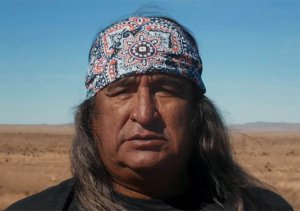Presented By: Penny W Stamps School of Art & Design
Carolina Caycedo, David de Rozas, and Juan Mancias
Somi Se’k, The Land of the Sun and the River of Spirits

Somi Se’k (The Land of the Sun-La tierra del Sol) is how the Estok Gna, the Carrizo Comecrudo Tribe of Texas, refer to the lands on both sides of the River of Spirits (Rio Grande), comprising the Chihuahuan Desert, the Rio Grande Valley, and its delta. Somi Se’k, is not just a name, nor a neutral place, but a multilayered net of universes where the region's present, past, and future are still in conversation. Caycedo, de Rozas, and Mancias’s talk will focus on Texas' native people’s philosophy, their profound knowledge and relationship to the land, and their continuous struggle to maintain their culture and lifeways against ongoing forms of colonization, erasure, and extraction.
Carolina Caycedo is a multidisciplinary artist based in Los Angeles. Her practice and research focus on the future of shared resources, environmental justice, energy transition and bio-cultural diversity. Through contributing to community-based construction of environmental and historical memory, Caycedo seeks ways of preventing violence against humans and nature. Caycedo is a 2023 Artes Mundi Prize Nominee, and a 2023-2024 Artist in Residence at the Getty Research Institute.
David de Rozas is an artist-filmmaker and educator based in Los Angeles. His research and practice explore the politics of memory as an embodied method and effective medium to conjure forms of collective resistance and restitution against a history of both cultural amnesia and physical violence. His award-winning films have been screened in festivals and film-curated series worldwide. David is currently a PHD student at the USC School of Cinematic Arts Media Arts and Practice.
Juan Mancias is the Tribal Chair of the Carrizo Comecrudo Tribe of Texas. Born in Dimmitt, TX, and raised in Plainview, Juan is the eldest born to a lineage of hereditary chiefs of the Carrizo Comecrudo. Juan has worked alongside the Sierra Club, protecting prairie dogs, organized marches against the Dos Republicos Coal mine, and initiated two inter-tribal organizations that are still viable and thriving today. Currently, he is building resistance to the fossil fuel industry and border wall construction, organizing efforts to assist asylum refugees, and reclaiming and protecting his tribe’s ancestral lands. Juan considers himself a protector of the true Texas people’s lifeways. He speaks from what he knows. His work today focuses on decolonizing both tribal people and others.
Carolina Caycedo is a multidisciplinary artist based in Los Angeles. Her practice and research focus on the future of shared resources, environmental justice, energy transition and bio-cultural diversity. Through contributing to community-based construction of environmental and historical memory, Caycedo seeks ways of preventing violence against humans and nature. Caycedo is a 2023 Artes Mundi Prize Nominee, and a 2023-2024 Artist in Residence at the Getty Research Institute.
David de Rozas is an artist-filmmaker and educator based in Los Angeles. His research and practice explore the politics of memory as an embodied method and effective medium to conjure forms of collective resistance and restitution against a history of both cultural amnesia and physical violence. His award-winning films have been screened in festivals and film-curated series worldwide. David is currently a PHD student at the USC School of Cinematic Arts Media Arts and Practice.
Juan Mancias is the Tribal Chair of the Carrizo Comecrudo Tribe of Texas. Born in Dimmitt, TX, and raised in Plainview, Juan is the eldest born to a lineage of hereditary chiefs of the Carrizo Comecrudo. Juan has worked alongside the Sierra Club, protecting prairie dogs, organized marches against the Dos Republicos Coal mine, and initiated two inter-tribal organizations that are still viable and thriving today. Currently, he is building resistance to the fossil fuel industry and border wall construction, organizing efforts to assist asylum refugees, and reclaiming and protecting his tribe’s ancestral lands. Juan considers himself a protector of the true Texas people’s lifeways. He speaks from what he knows. His work today focuses on decolonizing both tribal people and others.